Paiements numériques
Les technologies numériques transforment la manière dont nous répondons aux urgences. Les innovations sont multiples : elles concernent l’identification des personnes ayant droit à une aide, la collecte des données pour les évaluations et le suivi ou encore la communication aux communautés affectées par la crise. Les systèmes de paiement numérique, dont les appareils mobiles, les coupons électroniques et les cartes, lorsqu’ils sont utilisés de manière appropriée, peuvent accélérer, sécuriser et optimiser l’assistance, la rendant également plus inclusive. Toutefois, le volume de données personnelles que nous collectons, stockons et partageons augmentant, nous devons nous assurer que nos systèmes de protection des données restent pertinents et veiller à comprendre et atténuer les risques associés aux nouvelles technologies.
Contenu associé

Podcast: Is informed consent possible in humanitarian CVA?
Podcast
Episode 2 of the CashCast tackles data responsibility with Amos Doornbos, Linda Raftree, James Eaton Lee and Ric Tighe

Consent and Ownership in the Shift to Digital Cash and Voucher Assistance
Blog Post
Part of committing to cash and voucher assistance (CVA) is committing to going digital and collecting data. While they are two different things, they are deeply intertwined. And while an organisation can ‘go digital’ without cash programmes, it’s nearly impossible to commit to cash programmes in the long term without going digital. Yes, it is true we’ve done cash and voucher programmes...
Contenu récent

Dossier stratégique du cluster mondial pour l’éducation liste de contrôle sur les transferts monétaires
Guides et outils
La présente liste de contrôle fournit des orientations qui vous aideront à envisager les modalités d’exécution des transferts monétaires tout au long du document de stratégie du Cluster et du processus d’élaboration de celle-ci, de la même façon que pour l’aide en nature. Les transferts...

Digital Currency Governance Consortium White Paper Series
Report
The Digital Currency Governance Consortium (DCGC) convenes more than 85 organizations from the public sector, private sector, civil society and academia to provide a global perspective towards addressing high priority policy and governance issues surrounding new forms of digital currency. DCGC has focused...

The Unblocked Cash Experience in Vanuatu
Case Study
This report provides details of the Vanuatu Business Resilience Council’s (VBRC) role and approach to supporting the businesses in the Oxfam UnBlocked Cash humanitarian programme in 2020-2021 in Vanuatu. While this report documents the learnings using blockchain technology, by sharing the key details...
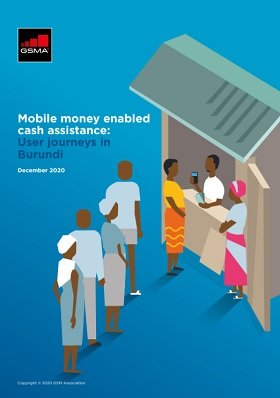
Mobile money enabled cash assistance: User journeys in Burundi
Report
GSMA’s Mobile for Humanitarian Innovation programme teamed up with Ground Truth Solutions to apply a human-centred design approach to understand the user journeys of Concern Worldwide’s cash recipients in Burundi. It provides insights into how humanitarian organisations and mobile money providers can...

Stepping up CVA with COVID-19: Paving the way we respond to future crisis
Report
COVID-19 has thrown the world into lockdown and taken a tremendous toll on the health, social, and economic status of vulnerable communities, households, and individuals. Limitations on daily activities and an over-arching health crisis, restrictions on movement, closures of schools and businesses have...
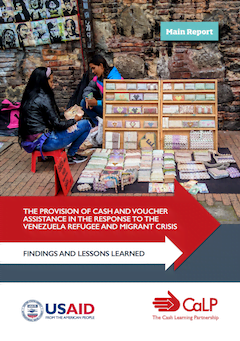
The Provision of Cash and Voucher Assistance in the Response to the Venezuela Refugee and Migrant Crisis: Findings and lessons learned – Main report
Report
This study, for which data was compiled between March and April 2020, seeks to document lessons and good practices in the delivery of CVA in Ecuador and Colombia by humanitarian organisations and governments, in response to migrants and refugees from Venezuela. The purpose of this analysis is...

Summary: Lessons and Recommendations on the Use of CVA for the Caribbean Atlantic Hurricane Season
Report
This is a summary document of the CALP Network’s Winds of Change: Lessons and Recommendations on the Use of CVA in the Caribbean and includes a matrix of learning and evidence from the region used to inform the report. This document is made possible by the generous support of the American people...
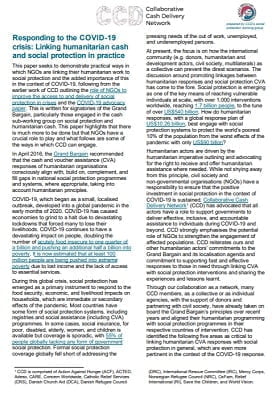
Responding to the COVID-19 Crisis: Linking humanitarian Cash and Social Protection in practise
Report
This paper seeks to demonstrate practical ways in which NGOs are linking their humanitarian work to social protection and the added importance of this in the context of COVID-19, following from the earlier work of CCD outlining the role of NGOs to
improve the access to and delivery of social protection in...

Presentation for the CALP Network’s webinar on remote registration and verification in the COVID-19 response
Presentation
Watch the webinar recording here Speaker presentations from the CALP Network’s 14 July 2020 webinar on: Peril or pitfalls?: Emerging practices on remote registration and verification in the COVID-19 response Remote CVA programming has been highlighted as a key challenge for the community of practice in...

COVID-19: Invest now in cash/voucher-social protection scale-up or children pay the price later
Report
Read the article here. Only socially accountable Social Protection Assistance beyond humanitarian cash/voucher programmes – if properly and quickly implemented – will protect generations of children from the aftershocks of COVID-19. Despite cash and voucher transfers becoming the tool of choice of...

Collaborative Cash Delivery Network – Grand Bargain – Collaboration Agreement Accomplishments 2020
Report
The Collaborative Cash Delivery (CCD) Network is pleased to present its achievements against the commitments made by our global members’ CEOs at the 2019 Grand Bargain Summit as part of our global collaboration agreement. We know we are better together, and in this time of increasing pressure on the...
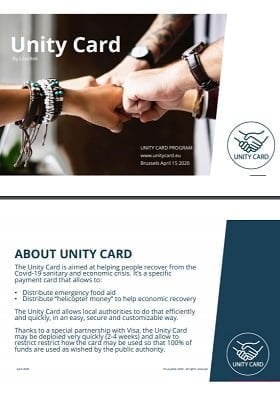
Unity Card
Presentation
In response to NCOVID, we have launched UNITY CARD,
which gives immediate technical support to the deployment of cash aid via this special card payments
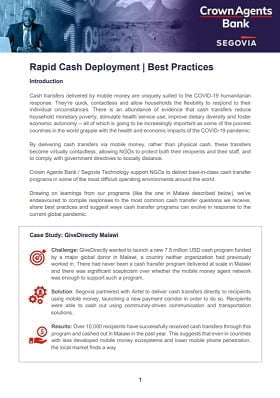
Best Practices for Rapid Cash Deployment
Guidelines and Tools
This note shares some best practices for rapid cash transfers based on our experience delivering cash transfer programs in difficult operating environments. Crown Agents Bank (CAB) and Segovia Technology joined forces last year to seamlessly manage payments to mobile wallets and banks in Africa. CAB has a...

We Turn Mobile Sim Cards Into Bank Accounts for the Emerging World
Presentation
Fonbnk LLC (“Fonbnk” or the “Company”) is new distributed finance company, providing borderless banking infrastructure directly to unbanked people around the world using the mobile internet. Anyone with a prepaid mobile SIM card and a verified online identity can now have a global stored value...

Webinar | Multi-purpose Cash Transfer and Child Protection: a case study (English and Spanish editions)
Webinar recording
Watch the webinar recording here. More information here. In 2018, with the support of OFDA and FFP, Save the Children implemented a multi-purpose cash transfer ‘Plus’ program in response to the influx of Venezuelan into Colombia. The program aimed at covering vulnerable household’s basic needs and...

CCD Ethiopia one-year in: Collaboration in reality
Report
Based on insights compiled from surveys and interviews conducted with members of the Ethiopian cash community and CCD (Collaborative Cash Delivery Network) members in January 2020, this report provides an overview of how CCD Ethiopia is working towards global and national objectives, takeaways for startup...
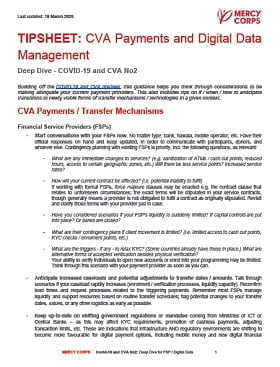
Mercy Corps Tipsheet: CVA payments and digital data management
Guidelines and Tools
Building off the COVID-19 and CVA tipsheet , this guidance helps you think through considerations to be making alongside your current payment providers. This also includes tips on if/when/how to anticipate
transitions to newly viable forms of transfer mechanisms/technologies in a given context.

Cash Week 2019: How cash is driving change across the system
Blog Post
Cash Week 2019 aimed to provide a space to reflect, learn, and look ahead, to ensure quality in our use of CVA at scale. The CALP team reflects on the key takeaways from the events that took place around the world, and what they mean for actors within and beyond the humanitarian sector.

Transferts monétaires et risques : ce qui se passe sur le terrain, reste sur le terrain (et pourquoi c’est un problème)
Blog Post
En octobre 2019, le CALP Network a facilité à Douala, au Cameroun, une réunion de partage d’expériences sur les risques liés à la protection des bénéficiaires dans les interventions monétaires. Cette réunion restreinte, organisée dans le cadre d’une série de rencontres dans différentes...

Consent and Ownership in the Shift to Digital Cash and Voucher Assistance
Blog Post
Part of committing to cash and voucher assistance (CVA) is committing to going digital and collecting data. While they are two different things, they are deeply intertwined. And while an organisation can ‘go digital’ without cash programmes, it’s nearly impossible to commit to cash programmes in the...


